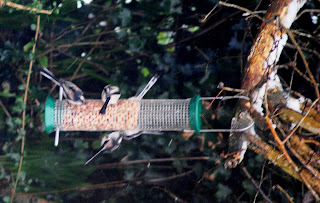It now appears that more than 10 million 'beef' burgers have been removed from supermarket shelves in England and Wales following the discovery, in Irish laboratories, that many of the 'economy' products contained detectable traces (up to almost 30% in one case) of horse or pig protein (http://www.guardian.co.uk/world/video/2013/jan/18/horse-meat-burgers-shock-consumers-video). Among the worrying aspects of this story are the claims that the 'inappropriate DNA' may have made its way into these foods by the addition of 'grind' (powered material obtained from boiling and grinding skins) used to booster protein content/ water retention, perhaps imported ultimately from untested South American sources; the fact that, in response to commercial pressures, the UK seems to be scaling down its own testing of products from abattoirs and claims that attempts by some supermarkets to drive down prices, result in some manufacturers using inappropriate (illegal?) routes to generate any kind of profit. The waste involved in junking 10 million burgers is also an issue, given the recent revelations about uneaten food in this country.
This blog may help people explore some of the 'hidden' issues involved in certain media treatments of environmental and scientific issues. Using personal digital images, it's also intended to emphasise seasonal (and other) changes in natural history of the Swansea (South Wales) area. The material should help participants in field-based modules and people generally interested in the natural world. The views are wholly those of the author.
Sunday, 20 January 2013
Russeling Up Support for Wallace
It is timely that the British Museum of Natural History is arranging an exhibition on the 'forgotten man of evolution', Alfred Russel Wallace (http://www.guardian.co.uk/science/2013/jan/20/alfred-russel-wallace-forgotten-man-evolution?INTCMP=SRCH). Wallace (a Welsh-born explorer who left school at 13 and made a living by collecting specimens for Victorian natural history enthusiasts and museums in remote areas of the globe) had none of Charles Darwin's wealth or connections but came up with the idea that species evolved by undergoing changes in pre-existing species. He sent the draft of his paper to Darwin who, it appears, was then stimulated to go into print with precisely the same concept that he had been incubating for several years. Although the pair were credited as co-developers of the theory of evolution, now fundamental to the Biological Sciences, Wallace has been largely ignored for many years. This might redress the balance to a degree.
Friday, 18 January 2013
Thursday, 17 January 2013
Smoking the Bees Out?
The European Food Safety Authority has ruled that neonicotinoid pesticides (those most widely used) present an 'unacceptable danger to honeybees' (http://www.guardian.co.uk/environment/2013/jan/16/insecticide-unacceptable-danger-bees?INTCMP=SRCH). This debate has been running for some time and the pesticide manufacturer claims that data supporting this view has been subject to 'over-interpretation'. Our dependence on these currently challenged pollinators means, however, that the data has to be urgently evaluated and appropriate action taken.
Rain- Appreciating Butterflies?
News that, in spite of a generally disastrous year for UK butterflies, species with grass-eating caterpillars have boomed is interesting (http://www.guardian.co.uk/environment/2013/jan/17/grass-feeding-butterflies?INTCMP=SRCH). Meadow brown (Maniola jurtina), Ringlet (Aphantopus hyperantus) and Gatekeeper (Pyronia tithonus) have all shown increases in numbers. It appears that our recent wet summers have encouraged the growth of their preferred nosh!
Saturday, 12 January 2013
Thursday, 3 January 2013
The Fin End of the Wedge
A most disturbing picture is a photograph of thousands of shark fins being dried behind walls in Hong Kong (http://www.google.co.uk/imgres?hl=en&sa=X&tbo=d&biw=1280&bih=751&tbm=isch&tbnid=3uaXr9QCFteKnM:&imgrefurl=http://www.guardian.co.uk/world/picture/2013/jan/03/hong-kong&docid=aKCC-xVLlX9rbM&imgurl=http://static.guim.co.uk/sys-images/Guardian/Pix/pictures/2013/1/3/1357202868787/Thousands-of-shark-fins-d-006.jpg&w=780&h=525&ei=vcLlUMWcC4eM0AWT-IDIBw&zoom=1&iact=hc&vpx=199&vpy=165&dur=11847&hovh=184&hovw=274&tx=162&ty=213&sig=108629131164605584465&page=1&tbnh=137&tbnw=210&start=0&ndsp=25&ved=1t:429,r:1,s:0,i:158). The fins are destined for shark's fin soup but the picture hints at the enormous wastage involved in this process.
Out of Africa?
The new, 6-part 'David Attenborough' series on 'Africa' was unleashed last night (http://www.guardian.co.uk/tv-and-radio/gallery/2013/jan/02/africa-david-attenborough-bbc1-series-pictures) with a first episode on the Kalahari desert. Attenborough takes credit for the (scripted?) voice-over but the footage is provided by natural history photography professionals. It is visually stunning but some of the sequences (e.g. gentle, 'sociable' rhinoceros by star-light; Meerkats being 'conned' by Drongos; territorial male giraffes etc) may be somewhat atypical of the 'normal' species behaviour. The economics of desert lives may predispose species to act in ways slightly different from that seen in other parts of their range. Animal behaviour seems to me to be more flexible than it is usually given credit for! Like some of the critics, I also could have done without the mood music (but I could always have switched the sound off).
Subscribe to:
Posts (Atom)
Sandwich Island Saga 38. You Don't Need to be a Mystic!
There's a stark lesson to be learned from the loss of life (around 90 deaths confirmed) at on July 4th at Mystic Camp in Kerr County. In...

-
It should hardly be called a study. A Which comparison looked at levels of nitrogen dioxide and small particulates (PM 2.5s) in 5 Londo...
-
Europe has a city congestion problem. In 2023, London was the most gridlocked location, closely followed by Paris and Dublin. In that year...
-
It's necessary, where possible, to replace diesel and petrol-fueled vehicles by electrical equivalents. Electric vehicles (EVs) don...




+close+up+on+Mallow+NBGW.JPG)
++basking+in+grass+North+Gower.jpg)
+close+up+Blackpill.jpg)


+pair+meet.JPG)


